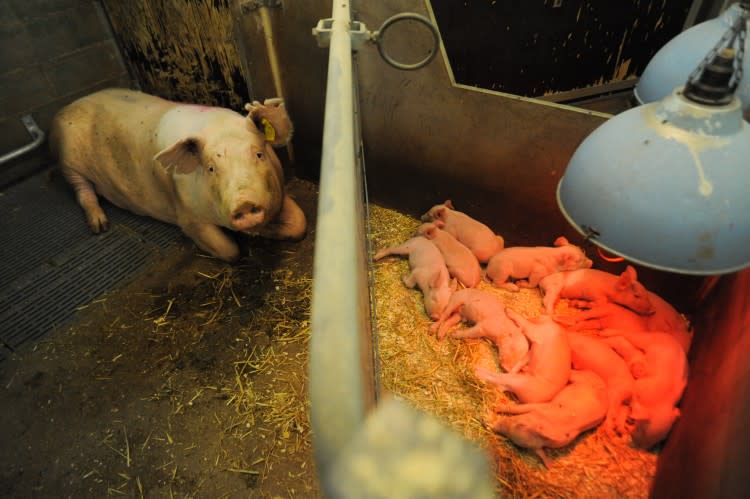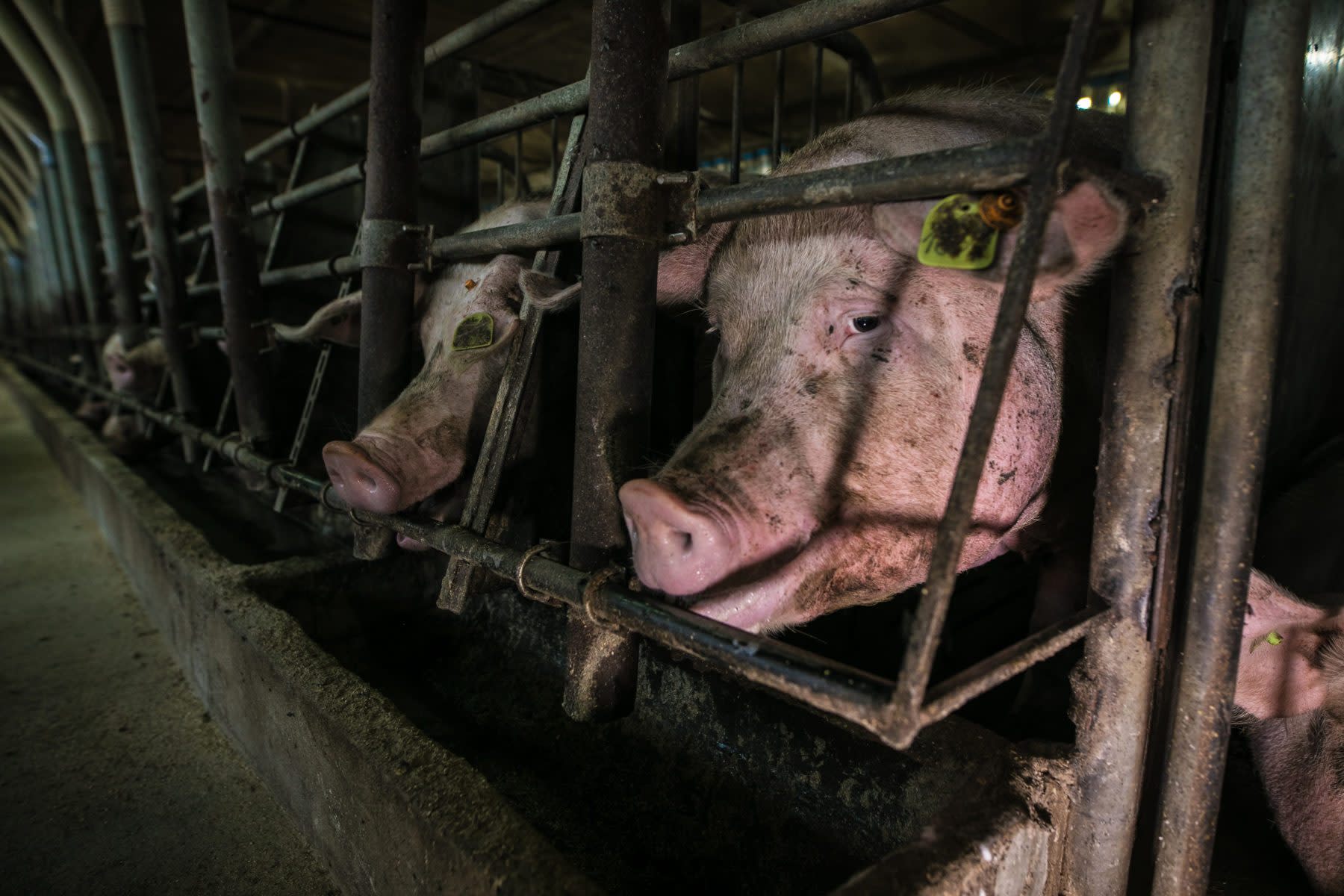




Mothers on factory farms are not treated as the emotional, sentient beings they are, but as breeding machines.

Mother’s Day is a time to appreciate the special bond between mothers and their children. This bond transcends species—cows, pigs, chickens, goats, and ducks, among others, all feel the instinct to love, protect, and nurture their young. However, on factory farms, they are often deprived of these natural nurturing behaviors. Mothers on factory farms are not treated as the emotional, sentient beings they are, but as breeding machines.
The close proximity of a mother to her infant or child is necessary for survival in humans and other mammals. Prolonged separation can contribute to distress, anxiety, illness, and attachment disorders in both the mother and the child. These negative impacts that occur following this separation are not unique to human beings. Mother chickens, pigs, and cows have to endure this painful separation many times throughout their life on a factory farm.
Mother Pigs
Just like human mothers, pig mothers develop strong bonds with their babies when given the chance. A paper published in the International Journal of Comparative Psychology determined that pigs possess complex traits similar to dogs and chimpanzees.
Pigs are highly social animals, and they enjoy cuddling up to other pigs, playing with, and grooming one another. They communicate using twenty different oinks, grunts, and squeals, and mother pigs have even been known to sing to their young while nursing. Mother pigs are very strategic about where they birth their babies and will seek out a safe place to build a nest. All of these natural instincts are taken away from pigs who are raised in factory farms.
From a young age, a female pig will be crammed into a small pen, known as a “gestation crate,” and forcibly impregnated. These pens are so small she won't be able to turn around or socialize with other pigs. Stressed, depressed, and in pain, she will eventually be moved to another similarly sized pen to give birth. While restrained, unable to properly bond with her babies, she will nurse them for just three weeks before they are ripped away from her. Mother pigs repeat this torturous cycle again and again until they are “spent”—unable to produce more litters—and sent to slaughter.
Mother cows
On dairy farms, calves are ripped away from their mothers within hours of birth, depriving them of the chance to create a maternal bond. This separation is deeply traumatic for both mother and baby. Studies have shown that baby cows separated from their mothers struggle to cope in stressful situations—in the filthy, overcrowded conditions of factory farms, stressful situations arise nearly every day.
Female calves are immediately confined to individual pens and have their horn buds removed at around eight weeks old. This cruel practice is excruciating and most often performed without any pain relief or a mother’s comfort.
Male calves have two potential fates. They will either be confined in a tight veal crate shortly after birth, preventing their muscles from developing fully, or sent to a feedlot to be fattened for beef production. Both of these paths end in slaughter for human consumption.
No matter where their babies go, mother cows all have the same experience: they are left helpless, never to see their babies again. Mother cows are very maternal and protective of their babies. Researchers evaluated maternal protective behavior by observing how mother cows would respond to an unfamiliar vehicle approaching their calves. Out of the 341 cow-calf pairs observed, 99% of mother cows moved between the vehicle and their calves, presumably to physically protect them. When a mother cow is separated from her baby, the whites of her eyes increase dramatically. The amount of white in a cow’s eyes is used to determine whether a cow is experiencing fear or anxiety.
Sadly, a mother cow will endure this traumatic loss many times throughout her short life. Dairy cows are forcibly impregnated and give birth once a year for about four years, or until she is no longer producing enough milk to be financially lucrative. When the dairy farm has no use for her any longer, she will be sent to slaughter.
Mother Chickens
Chickens are not often given the same compassion or attention as other animals, and yet they endure some of the worst treatment of all. In the United States alone, 9 billion chickens are killed for consumption each year, and 305 million hens are used for their eggs. That’s millions of mothers that will never get to meet their babies.
Hens are affectionate mothers and are instinctively protective over their young. When a hen lays her eggs, she tends to them with care and can even communicate with her chicks while still inside the egg.
Egg-laying hens in the factory farming industry are often kept in battery cages with no room to stand up straight or spread their wings. They are not given enough space to act like hens at all. In the wild, a hen spends her days socializing, pecking for food, taking dust baths, or resting in the sun. In battery cages, they spend their lives stacked on top of other hens, often with broken bones, suffering from ammonia burns and osteoporosis.
In these horrific conditions, countless hens will lay their eggs which they will never see hatch. Those eggs will be taken to a hatchery where female chicks will endure the same fate as their mothers, and male chicks, unable to produce eggs of their own, will be tossed out or ground alive in a cruel process known as “chick culling.” A mother hen’s suffering won’t end here. A mother hen’s suffering won’t end here. Once their egg production decreases after about two years, they, too, are killed through live-shackle slaughter, one of the cruelest practices animals are subjected to in the food industry.
No mother, whether she is a cow, a pig, a hen, or a human, should have to endure the heartache of losing their baby for a company’s profit. This Mother’s Day, join us in fighting for the rights of animal mothers on factory farms.
 Mica von Turkovich
Mica von Turkovich




